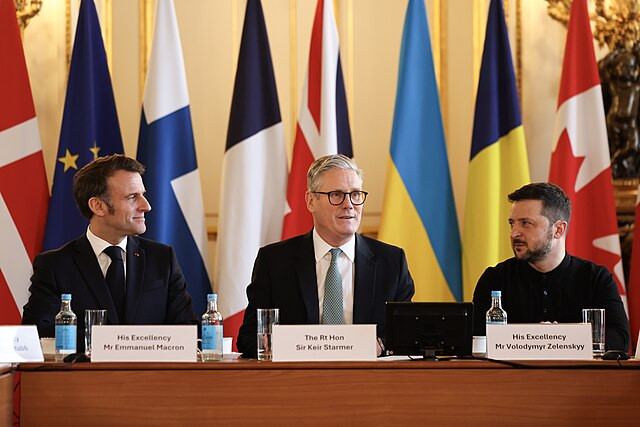European leaders are accelerating discussions on security guarantees for Ukraine after a high-profile White House meeting with President Donald Trump and Volodymyr Zelenskyy, even as questions linger over Vladimir Putin's willingness to meet his Ukrainian counterpart.
French President Emmanuel Macron and British Prime Minister Keir Starmer co-chaired a virtual session of the "coalition of the willing" on Tuesday, joined by European Council President António Costa. The push came just one day after Trump hosted Zelenskyy and several European leaders in Washington, where the U.S. president said Putin had agreed in principle to face-to-face talks with Zelenskyy in the coming weeks.
Macron proposed Geneva as a venue, while U.S. officials suggested Hungary could also be under consideration. But Moscow has yet to confirm the prospect of such a summit. Kremlin aide Yuri Ushakov said only that Trump and Putin had discussed "raising the level of representatives" in ongoing negotiations, without explicitly endorsing a trilateral meeting. Russian Foreign Minister Sergei Lavrov told state TV that any talks between Putin and Zelenskyy would require "very thoroughly" prepared groundwork.
Trump, in an interview with Fox News, acknowledged doubts. "We're going to find out about President Putin in the next couple of weeks... It's possible that he doesn't want to make a deal," he said, while noting Putin faced a "rough situation" if he rejected talks.
At the heart of the debate among European allies is the framework of security guarantees that could accompany a settlement. Zelenskyy described such guarantees as "a key issue, a starting point towards ending the war," and said they would be formalized "in some way in the next week or 10 days." Trump posted late Monday that the U.S. would act as "coordinator" while European states supplied the assurances.
Options under discussion include a collective defense clause akin to NATO's Article 5, or the deployment of a European "reassurance force" to deter renewed Russian aggression. Britain and Italy have expressed support, though Moscow quickly rejected the idea. "We reaffirm our categorical opposition to any scenarios involving the stationing of a NATO contingent in Ukraine," Russia's foreign ministry said.
European leaders sought to underscore unity while balancing caution. "When we speak about security guarantees, we speak about the whole security of the European continent," Macron said. NATO Secretary General Mark Rutte praised Trump as "amazing" and said "if we play this well, we could end it." German Chancellor Friedrich Merz added that "the path is open now" but warned that next steps would be "more complicated."
Zelenskyy, who appeared in a blazer rather than his usual wartime hoodie, emphasized gratitude to his allies and rejected any settlement that would limit Ukraine's military strength. "A strong Ukrainian army" must be central to any deal, he said. He also thanked First Lady Melania Trump for sending a letter to Putin urging an end to the killing of children.






